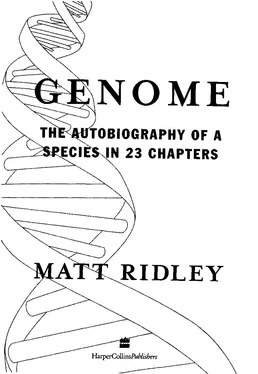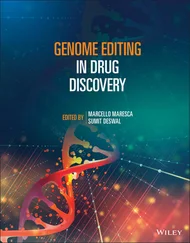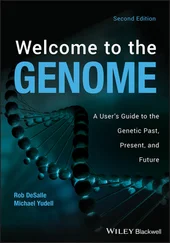Genome - Matt Ridley
Здесь есть возможность читать онлайн «Genome - Matt Ridley» весь текст электронной книги совершенно бесплатно (целиком полную версию без сокращений). В некоторых случаях можно слушать аудио, скачать через торрент в формате fb2 и присутствует краткое содержание. Жанр: Старинная литература, на английском языке. Описание произведения, (предисловие) а так же отзывы посетителей доступны на портале библиотеки ЛибКат.
- Название:Matt Ridley
- Автор:
- Жанр:
- Год:неизвестен
- ISBN:нет данных
- Рейтинг книги:5 / 5. Голосов: 1
-
Избранное:Добавить в избранное
- Отзывы:
-
Ваша оценка:
- 100
- 1
- 2
- 3
- 4
- 5
Matt Ridley: краткое содержание, описание и аннотация
Предлагаем к чтению аннотацию, описание, краткое содержание или предисловие (зависит от того, что написал сам автор книги «Matt Ridley»). Если вы не нашли необходимую информацию о книге — напишите в комментариях, мы постараемся отыскать её.
Matt Ridley — читать онлайн бесплатно полную книгу (весь текст) целиком
Ниже представлен текст книги, разбитый по страницам. Система сохранения места последней прочитанной страницы, позволяет с удобством читать онлайн бесплатно книгу «Matt Ridley», без необходимости каждый раз заново искать на чём Вы остановились. Поставьте закладку, и сможете в любой момент перейти на страницу, на которой закончили чтение.
Интервал:
Закладка:
The language instinct that we all possess is plainly one such complex adaptation, beautifully designed for clear and sophisticated communication between individuals. It is easy to conceive how it was advantageous for our ancestors on the plains of Africa to share detailed and precise information with each other at a level of sophistication unavailable to other species. 'Go a short way up that valley and turn left by the tree in front of the pond and you will find the giraffe carcass we just killed. Avoid the brush on the right of the tree that is in fruit, because we saw a lion go in there.' Two sentences pregnant with survival value to the recipient; two tickets for success in the natural-selection lottery, yet wholly incomprehensible without a capacity for understanding grammar, and lots of it.
The evidence that grammar is innate is overwhelming and diverse.
The evidence that a gene somewhere on chromosome 7 usually plays a part in building that instinct in the developing foetus's brain is good, though we have no idea how large a part that gene plays.
Yet most social scientists remain fervently resistant to the idea of genes whose primary effect seems to be to achieve the development I N S T I N C T 1 0 5
of grammar direcdy. As is clear in the case of the gene on chromosome 7, many social scientists prefer to argue, despite much evidence, that the gene's effects on language are mere side-effects of its direct effect on the ability of the brain to understand speech. After a century in which the dominating paradigm has been that instincts are confined to 'animals' and are absent from human beings, this reluctance is not surprising. This whole paradigm collapses once you consider the Jamesian idea that some instincts cannot develop without learnt, outside inputs.
This chapter has followed the arguments of evolutionary psychology, the reverse-engineering of human behaviour to try to understand what particular problems it was selected to solve. Evolutionary psychology is a new and remarkably successful discipline that has brought sweeping new insights to the study of human behaviour in many fields. Behaviour genetics, which was the subject of the chapter on chromosome 6, aims at roughly the same goal.
But the approach to the subject is so different that behaviour genetics and evolutionary psychology are embarked on a collision course.
The problem is this: behaviour genetics seeks variation between individuals and seeks to link that variation to genes. Evolutionary psychology seeks common human behaviour — human universals, features found in every one of us — and seeks to understand how and why such behaviour must have become partly instinctive. It therefore assumes no individual differences exist, at least for important behaviours. This is because natural selection consumes variation: that is its job. If one version of a gene is much better than another, then the better version will soon be universal to the species and the worse version will soon be extinct. Therefore, evolutionary psychology concludes that if behaviour geneticists find a gene with common variation in it, then it may not be a very important gene, merely an auxiliary. Behaviour geneticists retort that every human gene yet investigated turns out to have variants, so there must be something wrong with the argument from evolutionary psychology.
In practice, it may gradually emerge that the disagreement between these two approaches is exaggerated. One studies the genetics of 1 0 6 G E N O M E
common, universal, species-specific features. The other studies the genetics of individual differences. Both are a sort of truth. All human beings have a language instinct, whereas all monkeys do not, but that instinct does not develop equally well in all people. Somebody with SLI is still far more capable of learning language than Washoe, Koko, Nim or any of the other trained chimpanzees and gorillas.
The conclusions of both behaviour genetics and evolutionary psychology remain distinctly unpalatable to many non-scientists, whose main objection is a superficially reasonable argument from incredulity. How can a gene, a stretch of D N A 'letters', cause a behaviour? What conceivable mechanism could link a recipe for a protein with an ability to learn the rule for making the past tense in English? I admit that this seems at first sight a mighty leap, requiring more faith than reason. But it need not be, because the genetics of behaviour is, at root, no different from the genetics of embryonic development. Suppose that each module of the brain grows its adult form by reference to a series of chemical gradients laid down in the developing embryo's head - a sort of chemical road map for neurons. Those chemical gradients could themselves be the product of genetic mechanisms. Hard though it is to imagine genes and proteins that can tell exactly where they are in the embryo, there is no doubting they exist. As I shall reveal when discussing chromosome 12, such genes are one of the most exciting products of modern genetic research. The idea of genes for behaviour is no more strange than the idea of genes for development. Both are mind-boggling, but nature has never found human incomprehension a reason for changing her methods.
C H R O M O S O M E S X A N D Y
C o n f l i c t
Xq28 — Thanks for the genes mom.
T shirt sold in gay and lesbian
bookstores in the mid-1990s
A detour into linguistics has brought us face to face with the startling implications of evolutionary psychology. If it has left you with an unsettling feeling that something else is in control, that your own abilities, linguistic and psychological, were somewhat more instinctively determined than you proudly imagined, then things are about to get a lot worse. The story of this chapter is perhaps the most unexpected in the whole history of genetics. We have got used to thinking of genes as recipes, passively awaiting transcription at the discretion of the collective needs of the whole organism: genes as servants of the body. Here we encounter a different reality. The body is the victim, plaything, battleground and vehicle for the ambitions of genes.
The next largest chromosome after number seven, is called the X chromosome. X is the odd one out, the misfit. Its pair, the chromosome with which it has some affinity of sequence, is not, as I o 8 G E N O M E
in every other case, an identical chromosome, but is the Y chromosome, a tiny and almost inert stub of a genetic afterthought. At least that is the case in male mammals and flies, and in female butterflies and birds. In female mammals or male birds there are instead two X chromosomes, but they are still somewhat eccentric. In every cell in the body, instead of both expressing their genetic message at equal volume, one of the two at random packs itself up into a tight bundle known as a Barr body and remains inert.
The X and Y chromosomes are known as the sex chromosomes for the obvious reason that they determine, with almost perfect predestination, the sex of the body. Everybody gets an X chromosome from his or her mother. But if you inherited a Y chromosome from your father, you are a man; if you inherited an X chromosome from your father, you are a woman. There are rare exceptions, superficially female people with an X and a Y, but they are exceptions that prove the rule. The key masculinising gene on the Y
chromosome is missing or broken in such people.
Most people know this. It does not take much exposure to school biology to come across the X and Y chromosomes. Most people also know that the reason colour-blindness, haemophilia and some other disorders are much more common in men is that these genes are on the X chromosome. Since men have no 'spare' X chromosome, they are much more likely to suffer from these recessive problems than women — as one biologist has put it, the genes on the X chromosome fly without co-pilots in men. But there are things about the X and Y chromosomes most people do not know, disturbing, strange things that have unsettled the very foundations of biology.
Читать дальшеИнтервал:
Закладка:
Похожие книги на «Matt Ridley»
Представляем Вашему вниманию похожие книги на «Matt Ridley» списком для выбора. Мы отобрали схожую по названию и смыслу литературу в надежде предоставить читателям больше вариантов отыскать новые, интересные, ещё непрочитанные произведения.
Обсуждение, отзывы о книге «Matt Ridley» и просто собственные мнения читателей. Оставьте ваши комментарии, напишите, что Вы думаете о произведении, его смысле или главных героях. Укажите что конкретно понравилось, а что нет, и почему Вы так считаете.












